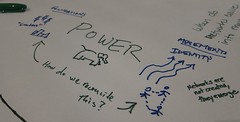
Guest post by Eugene Eric Kim (http://eekim.com/)
Over the past two days at the GEO / Monitor Institute conference, “Growing social impact in a networked world,”(http://www.geofunders.org/networksconference.aspx) I’ve heard several people ask some variation of the same question over and over again:
What is the role of the funder in all of this?
This question has been bugging me, and I’ve been trying to figure out why. During Mary Manuel’s session on movement and networks, it came to me. There’s an elephant in the room here, a word that I haven’t heard anyone use. That word is “power.”
Everyone here self-describes themselves as “funders.” If your frame is that of a funder, then your power derives from the fact that you give organizations money.
When you look at the world through a network lens, it’s not clear where money enters the equation. Investing in organizations may actually be antithetical to catalyzing networks. Networks need resources to operate, but they are not necessarily resources of the type or the scale that foundations are good at granting.
Given this, there’s a generative version of the question, “What is the role of the funder?”, and there’s an insidious version. The insidious version is:
Do I (the funder) still have power in a network-centric world?

When we express anxiety about giving up control, it’s really anxiety about losing power. (This assumes, of course, that you had control of the system in the first place.)
The generative version is:
What can I do to catalyze the network?
When you remove your “funder” hat and think of yourselves as changemakers who bring many resources to the table, you find that you have a plethora of resources to contribute:
- Convening power
- Access to data
- Access to thought leaders
- A systemic view of different challenges
- And yes, money
Perhaps the best thing you can do is not give money to networks, but instead leverage your other resources to help catalyze networks. If your identity is tied to being a “funder,” that may be a scary proposition, because it literally means a loss of identity.
The question that foundations who truly care about contributing to this space need to answer is: Are you willing to exchange your “funder” hat for a “changemaker” hat?
Eugene is co-founder of Groupaya, which helps groups work together more skillfully to create their futures. Groupaya (http://groupaya.net/)

Leave a Reply